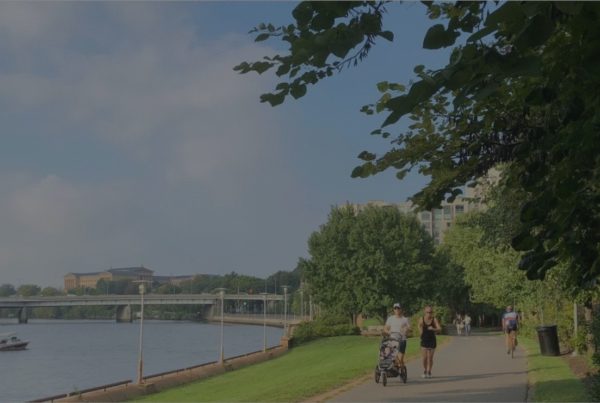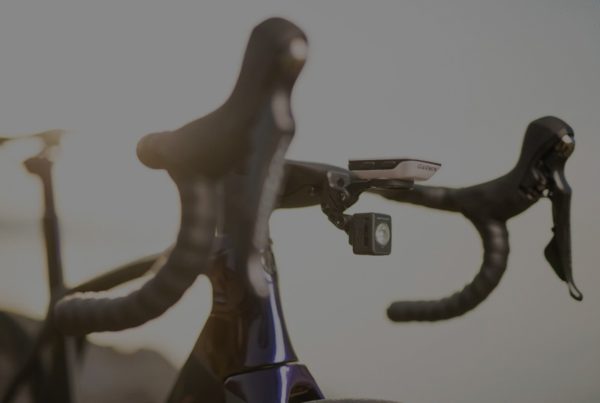The issue is whether a teen on a bike should be facing incarceration and a lifetime felony criminal record for failing to hear an alleged command to ‘Stop!’
It’s Saturday morning, and you’re riding on a quiet two-lane country road. Ahead is a four-way intersection, and a stop sign. The “road” to your right is a quiet one-lane country residential road. The “road” up ahead is a quiet, one-lane, dead-end road. The road you’re riding on arcs to the left, onto another quiet two-lane country road. There is no other traffic on the road, just you and your riding companion. Do you stop at the intersection? Or, seeing that there is no other traffic on the road, do you follow the arc to the left, onto the next road?
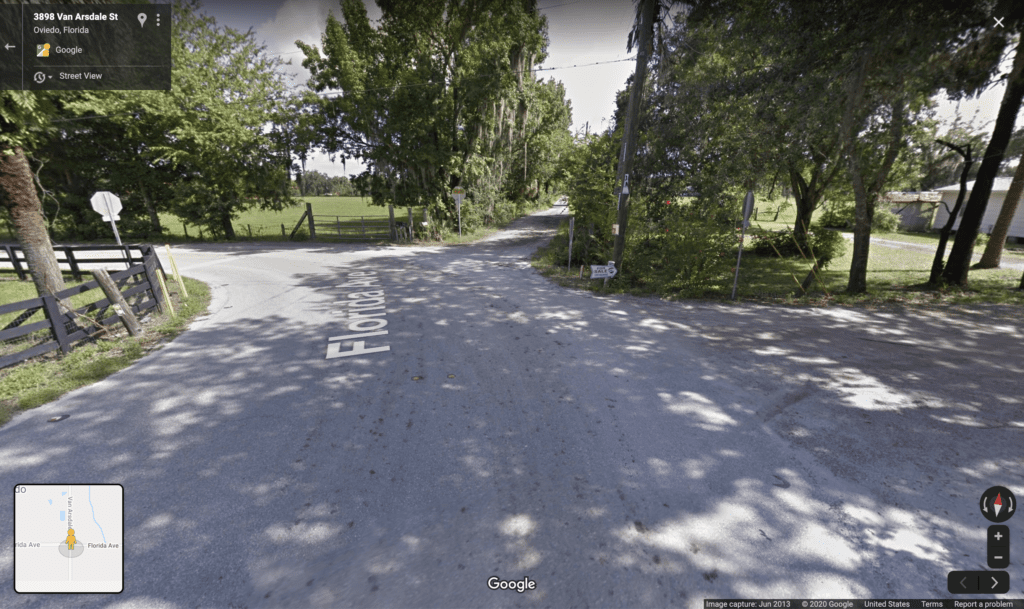
Some people would say “always stop.” But others would question what purpose is served by coming to a full stop on that road under those conditions, even if technically the law says you’re supposed to stop. Regardless, the law does require you to stop.
But increasingly, the law is beginning to change. Just 6 short weeks ago, Stop-as-Yield was illegal in Oregon. But at the same time, the Oregon legislature had passed a law that would make Stop-as-Yield legal. It had been the holy grail of bicycle legislation, always yearned-for, but never within reach. And then, suddenly, unexpectedly, it was within reach, and at midnight on December 31st, Stop-as-Yield became the law in Oregon.
RELATED: Why we need ‘Stop As Yield’
It had been a long haul. Idaho passed the first Stop-as-Yield law in 1982. And although there were efforts to pass a Stop-as-Yield law in other states, for 35 years, Idaho remained the only state with a Stop-as-Yield law.
Maybe people just needed time to get used to the idea.
And eventually, they did get used to the idea. After decades of effort to pass a Stop-as-Yield law in other states, the logjam finally broke in 2017, when Delaware passed a Stop-as-Yield law. Two years later, Arkansas joined the ranks of states with a Stop-as-Yield law, followed by Oregon.
Chaos ensued.
Just kidding.
There was no chaos. Things continued exactly as they always had, only now cyclists weren’t breaking a law that had never been a good fit for them in the first place. With the stroke of a pen, and the stroke of midnight, cyclists instantly went from reviled “scofflaws” to some of the most law-abiding citizens on the roads.
Drivers, meanwhile, continued to break every law imaginable, the skyrocketing injuries and fatalities for pedestrians and cyclists notwithstanding. Speeding? Every. Single. Driver. Distracted driving? Check. Dangerous passes? Check. “I didn’t see the cyclist”? Every. Single. Day.
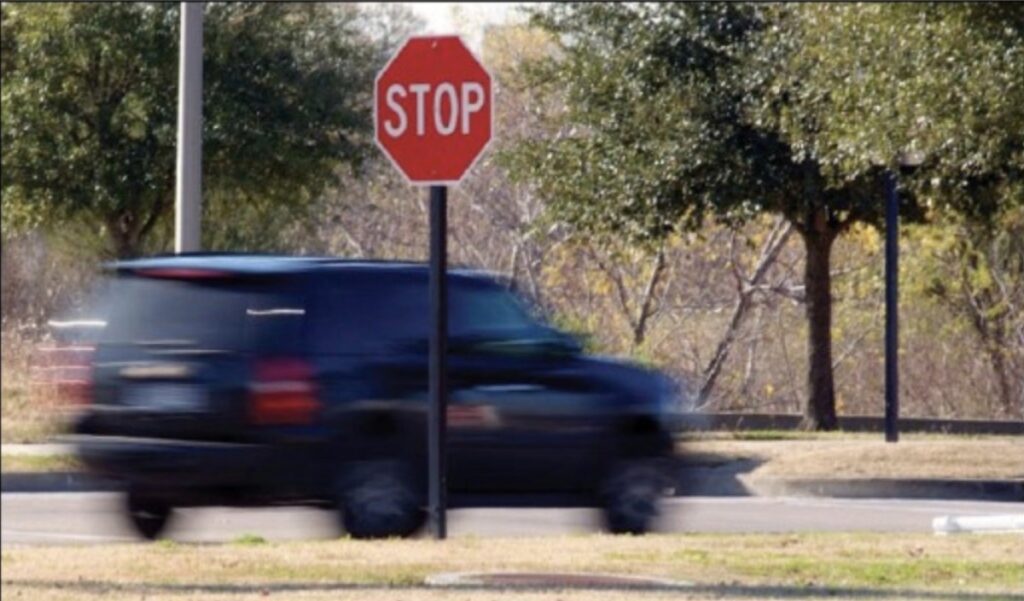
Scofflaw driver
And the most dangerous state in the union for cyclists? Florida.
Which makes an arrest in Florida this past weekend a real Alice in Wonderland moment.
On a Saturday (February 8th) morning group ride in Oviedo, Florida, two teen cyclists were in a breakaway off the front of the group, holding a 25 second gap. As the two teens approached a left-hand turn controlled by a stop sign, a Rashomon-like incident unfolded in real time.
According to allegations made by a Seminole County Sheriff’s deputy, the two cyclists ran a stop sign at the intersection of Florida Avenue and Van Arsdale Street, and ignored his commands to stop.
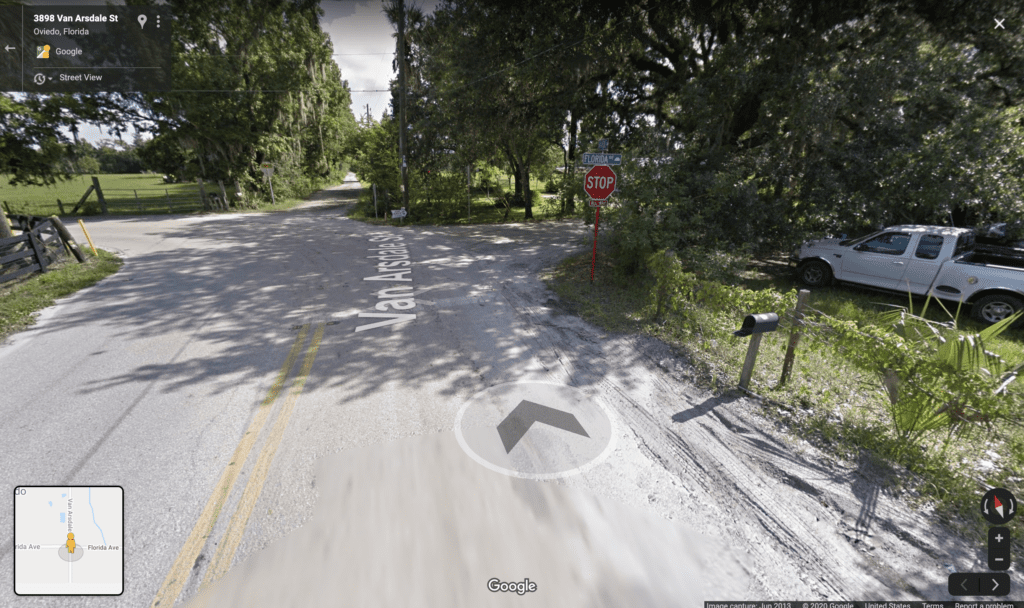
View of the intersection with stop sign the cyclists were approaching
Sheriff’s dash-cam video of the incident
Because this case is still unfolding, I can’t go into all of the details just yet, but for now, suffice it to say that there is more to this story than meets the eye. What I can say is that after negotiating the stop, the two teens quickly got back up to speed so they could maintain the gap. Shortly afterwards, the rest of the group came to a stop at the turn, and then continued the chase. And then, 25 seconds later, they came upon the two teens pulled over on the side of the road, with one of them, 18-year old Javier López, in handcuffs.
Sheriff’s body-cam video of the incident
There, the Rashomon-like nature of the alleged incident continued. After the two teens had turned onto Florida Avenue, the Sheriff’s deputy began pursuing them, sirens blaring. As he pulled up next to the two cyclists, with sirens still blaring, he ordered them to “pull over!” then pulled ahead of the two cyclists, steered his vehicle onto the shoulder, and brought the two cyclists to a stop.
RELATED: Why we need group ride liability (part 1)
Approaching López, the deputy said “I told you to stop, and you kept going.” López responded “Because we had…I stopped.” The deputy disagreed, and grabbed López’s arm. Confused by the deputy’s actions, López asked “why are you doing this?” The deputy responded “because I’m putting you in handcuffs.” López continued to ask “what are you doing,” but the deputy only replied “do not fight me, do not fight me right now,” and “do not fight me, stop resisting me right now” as he continued to handcuff López. As López continued to ask what he was doing, the deputy finally replied “putting you under arrest.”
At this point, the other cyclists in the group finally arrived on the scene. The rest of the group attempted to reason with the deputy, but he responded to their efforts with a blunt “today’s not the day for a roadside jury.”
So Javier López was arrested, taken to jail, and booked, with his bail set at $8,500.
For allegedly slowing and rolling through a stop sign.
Well, not exactly. The charges were “fleeing a law enforcement officer” and “obstruction without violence” (because López allegedly “resisted” when the deputy attempted to handcuff him).
But still, the underlying violation was alleged to be a slow-and-roll through a stop sign. And because there’s a fundamental disagreement about whether the two teens were fleeing or simply didn’t hear the deputy shout “Stop!,” Javier López is now facing a felony charge and a criminal record. For an alleged slow-and-roll.
Slow-and-roll is legal in Idaho. And Delaware. And Arkansas. And Oregon. And being considered in the Washington legislature. But it’s not legal in Florida…yet.
And that is not the issue.
The issue is whether a teen on a bike should be facing incarceration and a lifetime felony criminal record for failing to hear an alleged command to “Stop!” on an alleged and exceedingly-minor traffic violation in a state whose drivers present the greatest threat in the nation to cyclists.
As López’ riding companion attempted to explain to the deputy, they couldn’t hear his commands (likely because the siren was blaring). Several of the cyclists on the scene confirmed that they can’t hear clearly with the roar of the wind in their ears. They all thought the deputy was pursuing a driver, and were all surprised that the deputy’s hot pursuit, sirens blaring, was in pursuit of their riding companion. But the deputy wasn’t interested in the attempts of the group to reason with him; he responded to their efforts with a blunt “today’s not the day for a roadside jury.”
This arrest raises many questions which will need to be answered: Why was one of the two cyclists arrested, and not the other? If it was an arrest, why did the deputy handcuff the cyclist without explaining that he was under arrest? Why did the deputy refuse to consider that the cyclist may simply have not heard his alleged commands to stop as they were riding away from him, and later, as he was in pursuit, over the blare of the siren? Why did the deputy insist on elevating an extremely trivial traffic violation into a felony arrest when it was clear that the cyclists were trying to comply and were expressing confusion about the deputy’s allegations? And how can it possibly be a felony fleeing charge if the teens never heard a command to stop in the first place?
We need answers to these and other questions, and we need a path forward to prevent future excessive law enforcement responses to extremely trivial traffic violations by cyclists. This is not a one-off aberration; two days after Javier López was arrested, an internal investigation by the Orlando Police Department revealed that an Orlando Police Officer had been disciplined for “violating rules” because he used a taser on another teenage cyclist for attempting to ride away from him after popping a wheelie.
Sheriff’s body-cam video of the tasing incident
Saturday’s felony arrest story isn’t over yet, but fortunately, my colleague Peter Wilborn is assisting Javier pro bono, and I think there’s a good chance common sense and justice will prevail in this case. And if I’m right, and common sense and justice prevail, I think the next step in Florida has to be a serious effort to stop focusing law enforcement efforts on putting kids on bikes behind bars, and start focusing on getting a handle on the drivers who are making Florida’s roads the most dangerous in the nation.
More news to come later this week, so stay tuned.
Research and drafting assistance by Rick Bernardi, J.D.
Bob Mionske is a former competitive cyclist who represented the U.S. at the 1988 Olympic Games (where he finished fourth in the road race), the 1992 Olympics, as well as winning the 1990 national championship road race.
After retiring from racing in 1993, he coached the Saturn Professional Cycling team for one year before heading off to law school. Mionske’s practice is now split between personal-injury work, representing professional athletes as an agent and other legal issues facing endurance athletes (traffic violations, contract, criminal charges, intellectual property, etc.).
Mionske is also the author of “Bicycling and the Law,” designed to be the primary resource for cyclists to consult when faced with a legal question. It provides readers with the knowledge to avoid many legal problems in the first place, and informs them of their rights, their responsibilities, and what steps they can take if they do encounter a legal problem. If you have a cycling-related legal question please send it to Bob, and he will answer as many of these questions privately as he can. He will also select a few questions to answer in this column. General bicycle-accident advice can be found at bicyclelaw.com.
Important notice:
The information provided in the “Legally Speaking” column is not legal advice. The information provided on this public website is provided solely for the general interest of the visitors to this website. The information contained in the column applies to general principles of American jurisprudence and may not reflect current legal developments or statutory changes in the various jurisdictions and therefore should not be relied upon or interpreted as legal advice. Understand that reading the information contained in this column does not mean you have established an attorney-client relationship with attorney Bob Mionske. Readers of this column should not act upon any information contained in the website without first seeking the advice of legal counsel.



